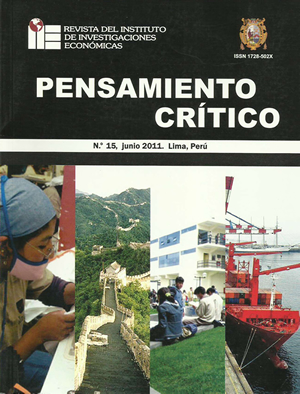Los fundamentos teóricos de los tratados de libre comercio
DOI:
https://doi.org/10.15381/pc.v15i0.9086Keywords:
Division of labor, partnership act, labour productivity, capital.Abstract
This article evaluates the theoretical foundations of free trade agreements considering the effects of trade between countries (unequally endowed by nature) when it is assumed that the respective productions can be transported freely from one country to another, but not the workers or the capital equipment. The division of labor between countries, increase productivity and work effort, therefore, advantageous to countries, despite the internal conditions of production may be more favorable to country A than country B. Should country A (country better equipped and technologically material) to produce goods in which its superiority is greater leaving the country B (country worst equipped and technologically material) to produce goods in which the superiority of country A is less. This inconsistency does not exploit these internal conditions more favorable production, going to buy these goods (which could occur in country A) in country B in which production conditions are more unfavorable results from the immobility of labor and capital, who can not go to country more favorable production. The law of association clear why there is a tendency to gradually strengthen cooperation between countries. The law of association is the motive to continue to encourage countries to join in search of mutual cooperation. Any progress towards a more advanced division of labor in the interests of the countries participating in the division of labor. The act of the people, stimulated by the perception of increased productivity of labor under the division of labor generates more trade between countries and makes them progressively developed The International Economy evidence the factors that cause the association and its progressive development. While the work is more productive under the sign of the division of labor and as long as people are able to realize this reality, the people tend to act spontaneously to cooperation and partnership. That condition, the higher productivity of the division of labor appears because their cause is a reality: the innate inequality of men and the uneven geographical distribution of natural factors of production.Downloads
Published
Issue
Section
License
Copyright (c) 2011 Pablo Rivas Santos

This work is licensed under a Creative Commons Attribution-NonCommercial-ShareAlike 4.0 International License.
THE AUTHORS RETAIN THEIR RIGHTS:
a. The authors retain their trademark and patent rights, and also on any process or procedure described in the article.
b. The authors retain the right to share, copy, distribute, execute and publicly communicate the article published in Pensamiento Crítico (for example, place it in an institutional repository or publish it in a book), with recognition of its initial publication in Pensamiento Crítico.
c. The authors retain the right to make a subsequent publication of their work, to use the article or any part of it (for example: a compilation of their works, notes for conferences, thesis, or for a book), provided they indicate the source of publication (authors of the work, journal, volume, number and date).






